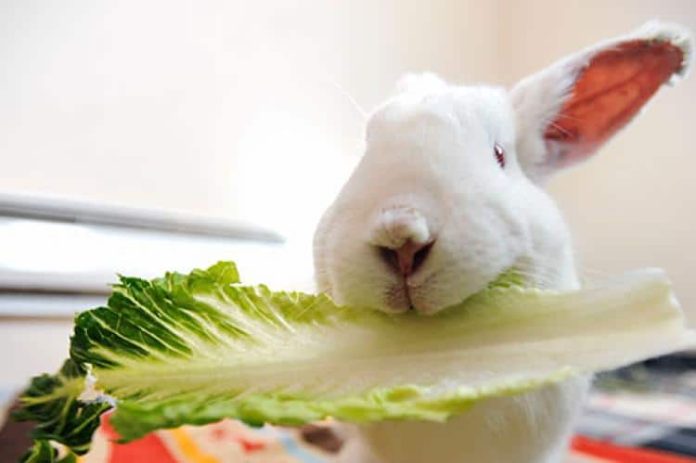For optimum health, it is important that your pet rabbit receives the correct diet for its needs. The basics of a good quality rabbit diet are fresh hay, fresh vegetables and good quality rabbit pellets. Rabbits need a high fiber and high roughage diet in order to keep their digestive system healthy.
Make sure you purchase rabbit pellets which are relatively high in fiber. Don’t be tempted to buy large amounts of pellets if you are not going to use them quickly, or they may become stale. Stay away from some of the commercial pellets containing cereals, dried fruit or seeds- your rabbit does not need these in its diet. It is best to stick to plain, good quality, varieties. Adult rabbits should be given ¼ cup of pellets per day, per 6lbs bodyweight, although larger, heavier breeds may require more.
Hay is a vitally important part of the rabbit diet, as it is the main source of fiber, which is essential in keeping your rabbit’s digestive system in good working order. Chewing on hay will also help to keep the teeth worn down. The best hay is made from grasses such as oat, wheat or timothy. It is possible to purchase hay made from alfalfa, but this tends to contain more calories and calcium (an excess of which could cause bladder or kidney problems) so should be avoided, especially if your rabbit is prone to putting on weight. Your rabbit should have access to fresh hay at all times. Check the hay regularly to make sure it is not stale or ‘musty’.
Your rabbit’s diet also needs to contain vegetables. Make sure all vegetables are fresh and organically produced- pesticides used on commercial crops can poison rabbits. Try to give your rabbit a mix of at least three different types of vegetables each day. The best vegetables to choose are root vegetables such as carrots, beetroot, parsnips and radishes, and dark leafy vegetables such as watercress, broccoli, dandelion leaves and spinach. Rabbits also enjoy grass freshly cut from your garden!
Fruit should be given a little more sparingly, as they contain sugars which can cause your rabbit to gain weight. The best fruits are apples, melon, pears, peaches (with the stones removed) and strawberries. Fruits containing high sugar levels, such as grapes and bananas, should be given only very occasionally. If your rabbit is overweight, avoid giving it fruits.
Commercial rabbit treats can be given occasionally, but be aware that these are often quite high in sugar and fat, so only give them as a treat. Pellets and vegetables should be divided into two meals, preferably given morning and evening, with hay always available.
Of course, your rabbit should have access to clean, fresh drinking water at all times. Drinking bottles which attach to the cage are better than water bowls, as these become contaminated very easily by feces and hay.
Your rabbit will also need to have the opportunity to exercise for a few hours each day in order to stimulate digestion and to keep its weight under control. If you are concerned that your rabbit is overweight or underweight, or notice any changes in its eating habits, consult your vet for advice.

